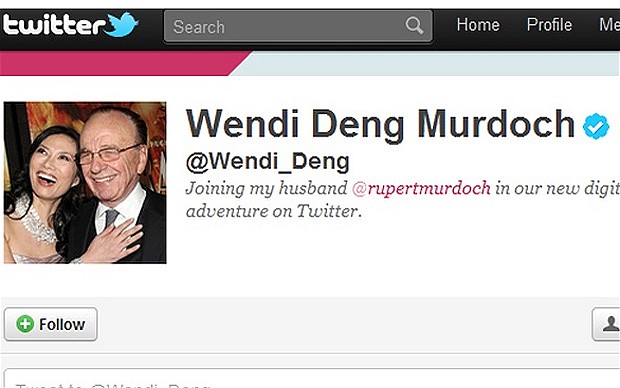Wendi, we hardly knew ye.
The all-too-brief period in which Mrs. Rupert Murdoch took to Twitter was thrilling for Murdoch-watchers, social media pros, and PR types. It seemed another example of the faux-democratizing power of the social Web. It also showed the cleverness of Ms. Deng, and her uncanny ability to humanize her much-reviled husband. (Who can forget the video of her bitch-slapping his pie assailant?)
Of course, @Wendi_Deng appeared rather quietly on Twitter after the much bigger news that her husband had embraced social media with a Twitter account of his own. Yet, unlike Sir Rupert’s terse and fairly mundane observations, @Wendi_Deng’s tweets were fun. They weren’t nakedly personal, but they revealed tantalizing tidbits about the Murdochian relationship, through kittenish exchanges that took us back to the (now sad) innocent days of @aplusk and @mrskutcher. Ah, billionaire love. Even the rich and famous flirt, bicker, and make up, but now they do it in front of thousands of followers. Fake Wendi actually scolded her husband for one of his cranky tweets, and he promptly deleted the post. Kind of cute.
But the delicious @Wendi_Deng was an imposter, of course. The fact that Twitter gave the account the familiar blue checkmark has undermined its supposedly bulletproof verification process for boldfaced names. Fake Wendi was also an embarrassment for News Corp., which seemed uncertain when asked about the account by the press. But the reddest faces may be at media outlets like the Associated Press and the British Guardian and Telegraph, which breathlessly reported the Deng account as real. And then there’s Sir Rupert himself, whose account is legit; did he even know that @Wendi_Deng was fake, or does he just like a bit of Twitter domination?
My brief fascination with fake Wendi got me thinking about how and why the real celebrities often pale in comparison to faux blogs or social media accounts that usurp their famous names. Writers, for instance, aren’t always interesting on Twitter; maybe the medium is just too constraining.
But stars like entertainers can also be dull. Many seem uncomfortable with the medium; they name-drop (or so it seems to us regular folks); they use Twitter as a broadcast medium chiefly to promote projects; or they’re just plain boring. Airplane rage notwithstanding, @alecbaldwin was an exception, with his witty, lightning-fast, and unapologetically cocky updates. Baldwin is sorely missed on my boldfaced list since shutting his account after the Words with Friends intervention late last year.
But, embarrassments aside, fake social media personas aren’t all bad PR; in fact, if you’re a celebrity or a mogul, they let you have it both ways! Those faux tweets and the fresh relevance they bring can breathe new life into a celeb’s image, who then bears no responsibility for the posts. They can simply retreat into full, Garboesque social media silence, whetting our appetite all the more by withdrawing. It’s a classic strategy.
It’s enough to make you wonder if a personality might quietly hire a ghost to impersonate them, gain attention, play coy for a bit, then issue a furious denial and sit back to watch the ripple effect. A Twitter impersonator in the social media age might just be a signal that you’ve arrived. If so, Mrs. Murdoch has one-upped her mogul husband – and probably not for the first time.

